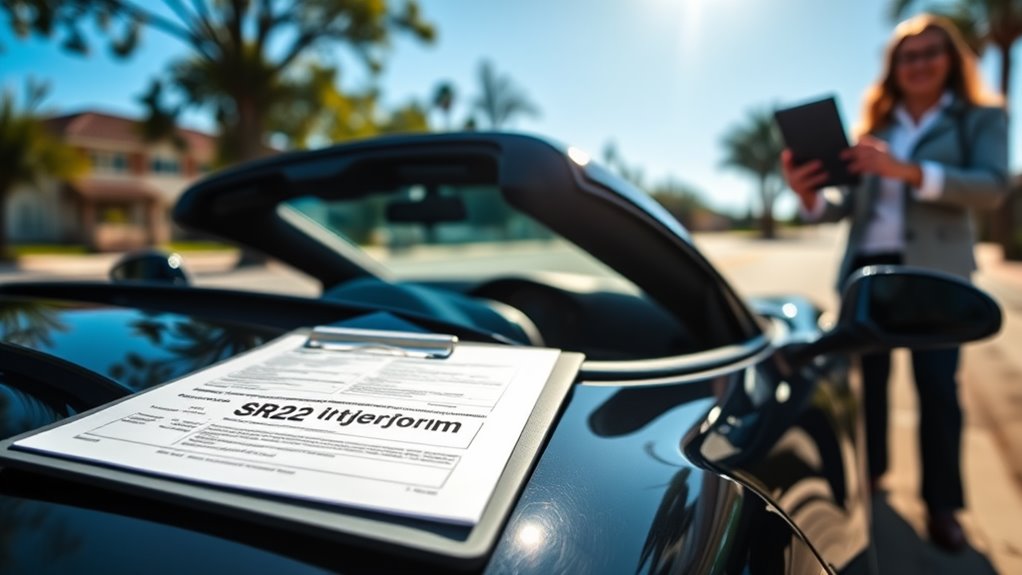3 Tips for SR22 Insurance Requirements
Maneuvering SR-22 insurance requirements can be complex, but understanding a few key strategies can make the process smoother. First, it's important to maintain continuous coverage to avoid penalties. You'll also want to explore the different types of non-owner SR-22 policies available. Finally, comparing rates from various insurers is essential for finding the best deal. Each of these steps plays a significant role in ensuring compliance and protecting your driving privileges. What's your next move?
Key Takeaways
- Ensure continuous coverage on your SR-22 policy to avoid license suspension and penalties due to lapses in insurance.
- Compare quotes from various insurers specializing in high-risk drivers to find competitive rates for your SR-22 insurance.
- Familiarize yourself with your state's specific SR-22 filing requirements to maintain compliance and prevent legal issues.
- Regularly review and update your policy to adapt to any changes in state regulations or personal circumstances.
- Make sure your insurer files the SR-22 form with the DMV promptly to confirm your financial responsibility status.
Understand the Types of Non-Owner SR-22 Policies

When you need to understand non-owner SR-22 policies, it's essential to recognize their unique purpose in meeting state insurance requirements. These policies are designed for individuals who don't own a vehicle but still need to demonstrate financial responsibility, often due to serious driving violations. They provide liability coverage, ensuring protection against damages to others while driving borrowed or rented cars, though they lack extensive or collision coverage for the vehicles themselves. To obtain this policy, you must have a valid driver's license and meet your state's residency requirements. Additionally, insurers will file the SR-22 form with the DMV to confirm compliance. Understanding these aspects helps you navigate the complexities of non-owner SR-22 policies effectively. Furthermore, these policies are specifically intended for high-risk drivers needing liability coverage. It's important to note that non-owner SR-22 insurance is often required for individuals who have had their licenses suspended due to serious driving violations.
Maintain Continuous Coverage to Avoid Penalties
Maintaining continuous coverage is essential for anyone with an SR-22 requirement, as lapses can lead to serious consequences. A lapse could result in license suspension and increased legal and financial penalties.
By consistently meeting SR-22 obligations, you demonstrate compliance with state regulations, which can help mitigate future risks. Additionally, maintaining coverage simplifies the reinstatement process if your license is suspended and prevents additional surcharges on your premiums.
To guarantee continuous coverage, set up automatic payments and regularly review your policy. Promptly update your coverage after any significant life changes, and choose an insurer that specializes in SR-22 policies.
Staying informed about your state's requirements will also help you avoid lapses and maintain your driving privileges.
Shop Around for Competitive Insurance Rates
Shopping around for competitive SR-22 insurance rates is crucial if you're looking to manage costs effectively while fulfilling your legal obligations.
Start by comparing quotes from multiple providers, as some specialize in high-risk drivers, which can greatly impact your premiums. For instance, State Farm offers an average annual rate of $782, while Country Financial is known for its low rates for drivers with DUIs.
Don't overlook discounts for bundling policies or completing defensive driving courses, which can further reduce costs. Use online tools to gather instant quotes and research insurers' reputations with SR-22 filings.
Finally, be aware of state-specific requirements to verify you're choosing the best coverage for your situation.
Conclusion
In summary, steering through SR-22 insurance doesn't have to feel like climbing Mount Everest. By understanding the types of non-owner policies, maintaining continuous coverage, and shopping for competitive rates, you can effectively manage your requirements. Staying informed about state regulations is essential to avoid penalties and guarantee compliance. Remember, taking these steps not only protects your driving privileges but also helps you find the best possible insurance options tailored to your needs.
